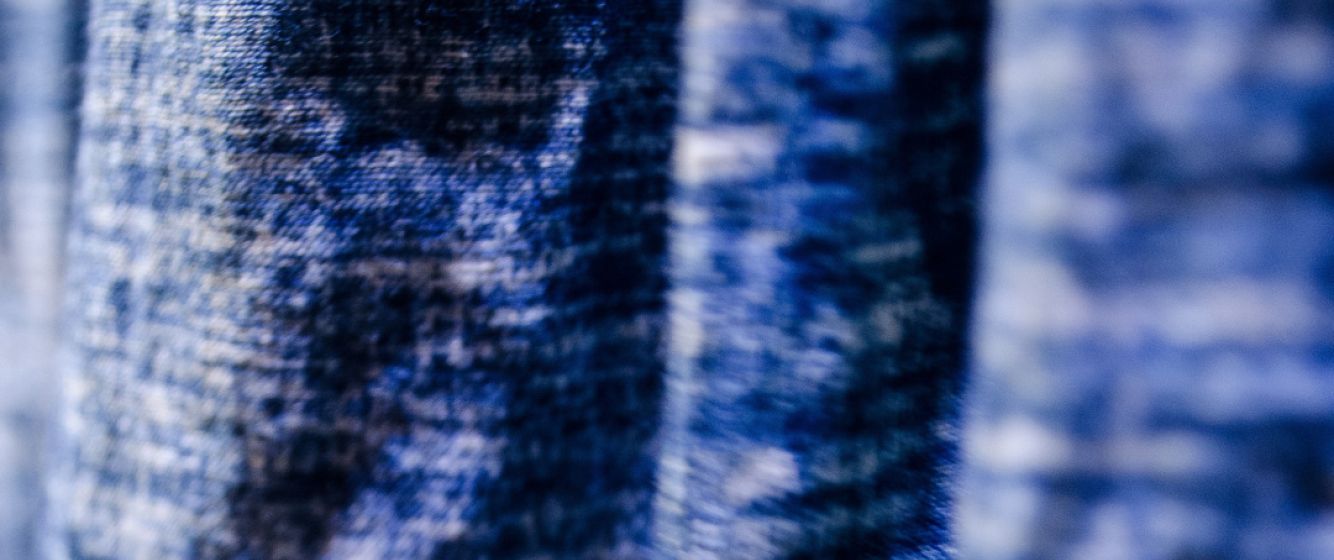
Indigo cloth, detail
Indigo Traditions and Itineraries: Towards a Syllabus for Humanities across Borders
A Humanities across Borders (HaB) Methodologies Workshop at Taipei National University of the Arts (TNUA), Taiwan, organized in association with IIAS.
Indigo was the ‘cross-over’ color par excellence: from the Orient to the European ruling classes, from a color-filled world of the wealthy and the churches in the West until the late Middle Ages to a color-less world of blacks and blues thereafter, from the ruling classes to the working classes, from its deep blue color to all colors thanks to aniline-based dyes replacing natural dyes, from a commodity to something animate and intimate that aged with its owner … (Taussig 2008:12).
The IIAS-TNUA HaB workshop will focus on the practice of indigo dye production and use in a global context. Transnational traditions and itineraries of indigo are windows into the material and humanistic landscape of a commodity and site of cultural reproduction from disparate frames of value and meaning.
The aim is to explore indigo as a methodological entry point
- as a plant, dye recipe and craft in the advancement of the sciences, arts and fashion;
- a stain of bonded labour in plantations
- a color of power, prestige and the sacred;
- a tradition of linguistic, economic and ecological knowledge-practice;
- an itinerary of global circulation for developing a trans-disciplinary HaB syllabus relevant beyond national and regional borders.
The HaB Methodology Workshop is an occasion to explore indigo as a methodological and pedagogical tool for surpassing borders based on territorial, temporal and disciplinary categories in higher education. We will examine indigo via the imaginary of ‘tradition’ in colonial and postcolonial constructions, as well as through its material ‘itinerary’ in global interactions and exchange over time. Focusing on indigo as both knowledge and practice, epistemology and pedagogy will permit engagement beyond the confines of the textbook and classroom and, at the same time, encourage context specific, in situ teaching and learning practices that can be reproduced anytime, anywhere.
Conversations and exercises at the Workshop will revolve around the knowledge-practice of indigo in Taiwan to trigger critical reflections on its meaning and practice in other Asian and African contexts for building a syllabus (including shared vocabulary and learning modules) that would eventually contribute towards the humanities across borders curriculum:
- Indigo as tradition (cultural construct)
- Indigo as itinerary (in the global, regional and local)
- Indigo as identity (gender, class and race)
- Indigo as pedagogy (beyond the classroom)
The Workshop will include hands-on experience and will be an occasion for participants from different perspectives and interests in indigo to meet and imagine a shared working syllabus on indigo:
- Students of TNUA (Museum Studies, Cultural Heritage, Fine Arts, New Media Arts)
- Centre for Interdisciplinary Research of Culture Resources, School of Culture Resources (faculties from the School of Culture Resources), TNUA
- Color and Culture Studies Laboratory (faculties from the School of Fine Arts, School of Culture Resources and School of New Media Arts), TNUA
- Craft artists and institute researchers
- Min Chin Kay Chiang, Graduate Institute of Architecture and Cultural Heritage, TNUA
- Aarti Kawlra, Academic Director, Humanities across Borders, IIAS, Leiden
- Françoise Vergès, Chair Global South(s) at the Collège d’études mondiales, Paris and Advisor, Humanities across Borders.
- Jocelyne Vokouma, INSS-CNRST, Burkina Faso
- Yoko Inoue, Artist and Faculty, Bennington College, USA
- Archana Shastri, Director, Asian Traditional Textiles Museum, Siem Riep Cambodia
- Yonehara, Craft journalist and faculty at the Traditional Crafts Innovation Centre at Kyoto Seika University, Japan
- Patrick Degeorges, a researcher at the Ministère de l’écologie in France, on Environmental Humanities.
- Prof Chen Kuo-tong, historian in Academia Sinica working on 17th century commodities in Taiwan
Together they will bring to the Workshop a rich mixture of intellectual and experience-based perspectives and individual trajectories to facilitate discussions from diverse disciplinary/professional backgrounds in an open atmosphere. Exposure to the discourse and practice of indigo cultivation, production, dyeing, and surface ornamentation in the vibrant context of Taipei city and TNUA will provide a rich context of inspiration for the participants. The conjunction of in situ exercises and discussions at the Workshop provide fertile ground for creating humanistic curricula development in different contexts across the world.
Taipei National University of the Arts (TNUA)
No. 1號, Xueyuan Road, Beitou District
Taipei City
Taiwan